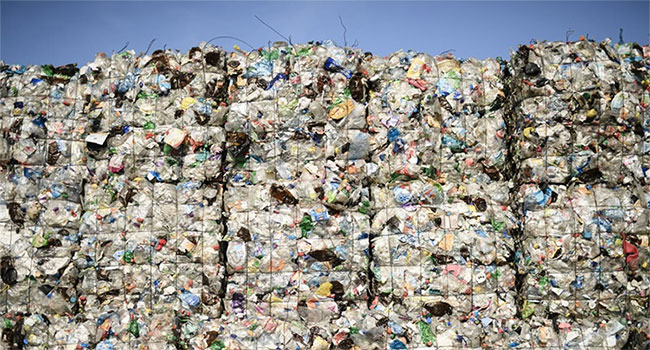Waste of biodegradable plastics produces greenhouse gases
Plastics used in everyday items from water bottles to packaging will produce greenhouse gases when decomposed in nature.
This study published in the August 1 issue of PLOS ONE raises concerns about the impact of this phenomenon on climate change.

Plastic waste at the waste treatment plant in Berlin, Germany.(Photo: EPA-EFE / VNA)
American and Canadian scientists conducted experiments with plastic bottles, shopping bags, industrial plastics and food containers. Among these, the most harmful gas-producing component is polyethylene in the shopping bag, which is also the most produced and discharged synthetic polymer in the world.
Research indicates that resins produced when biodegradable produce powerful greenhouse gases such as methane and ethylene. Greenhouse gases are believed to be the culprits that increase global temperatures, causing global warming and rising sea levels, threatening many coastal communities.
Although the emissions of decomposed plastic have not been calculated yet, the authors say that it is necessary to give a specific number soon when the Earth now faces more than 8 billion tons of plastic waste and the amount of plastic produced Ants doubled in the next 20 years.
Previous studies have shown that since 1950, more than 9 billion tons of plastics have been produced, most of which are released into the environment or buried. According to another study published in March, the massive trash island - where plastic waste gathers in the Pacific - is 16 times larger than the previous estimate, threatening marine life.Plastic waste has long been known to be a source of toxic chemicals that penetrate soil and water, causing harm to human health.
- Self-destructable wood from rice hulls
- Turn carbon dioxide into plastic
- Biodegradable plastics help reduce environmental pollution
- 43% of greenhouse gases from agricultural activities
- Video: Harmful to the environment of solar cells
- Two new types of greenhouse gases are rising
- Dairy farming contributes significantly to greenhouse gas emissions
- Ocean waves play an important role in trapping greenhouse gases
- Greenhouse gases increase extreme rainfall
- Greenhouse gases will double after two decades
- Earthquakes can release greenhouse gases in the ground
- The Arctic Ocean emits greenhouse gases
 Is the magnetic North Pole shift dangerous to humanity?
Is the magnetic North Pole shift dangerous to humanity? Washington legalizes the recycling of human bodies into fertilizer
Washington legalizes the recycling of human bodies into fertilizer Lightning stone - the mysterious guest
Lightning stone - the mysterious guest Stunned by the mysterious sunset, strange appearance
Stunned by the mysterious sunset, strange appearance